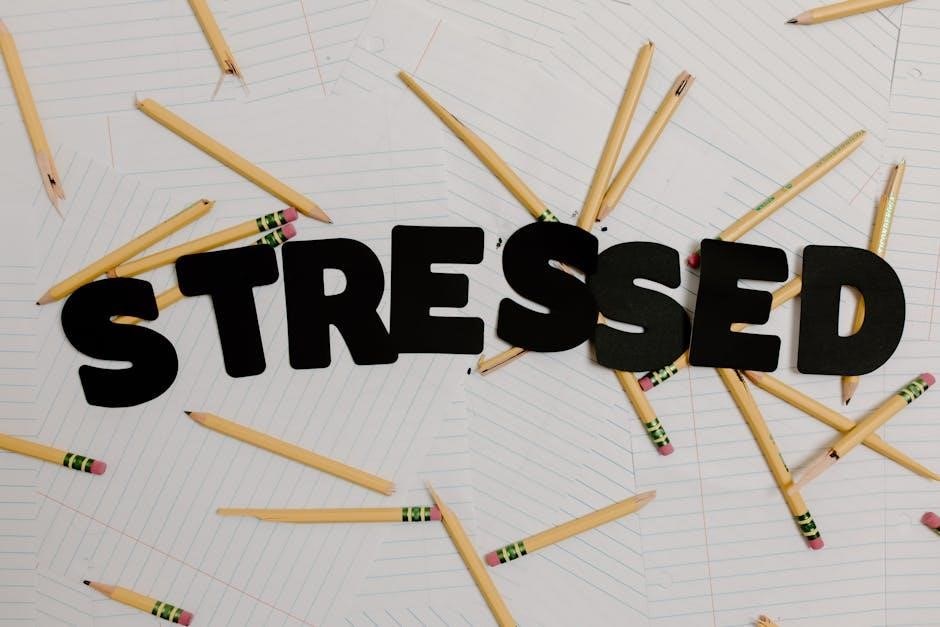The WALC Word Finding PDF is a workbook designed to improve word retrieval skills in individuals aged 16 and up. It offers structured activities and strategies for speech-language pathologists (SLPs) to support diverse clients effectively.
1.1 Overview of the WALC Word Finding PDF
The WALC Word Finding PDF is a comprehensive workbook designed to enhance word retrieval skills in individuals aged 16 and above. It provides a variety of exercises and activities tailored to address mid- to high-level complexity in word finding. The workbook is widely used by speech-language pathologists (SLPs) and other specialists to support clients with diverse needs. Its structured approach includes repetition, visual aids, and practical tasks to improve language cognition and communication abilities effectively.
1.2 Purpose and Scope of the Document
The WALC Word Finding PDF is specifically designed to assist speech-language pathologists (SLPs), educators, and therapists in helping individuals improve word retrieval skills. Its primary purpose is to provide structured exercises and strategies to enhance communication abilities. The document targets individuals aged 16 and above, focusing on mid- to high-level complexity tasks. It includes practical tools and activities aimed at improving language cognition and addressing diverse client needs effectively, making it a versatile resource for therapy and educational settings.

Key Features of the WALC Word Finding PDF
The WALC Word Finding PDF offers structured activities, visual aids, and reproducible exercises, making it a practical tool for improving word retrieval skills in diverse populations.
2.1 Target Skills and Objectives
The WALC Word Finding PDF focuses on enhancing word retrieval skills, a critical aspect of communication and cognitive function. Its primary objective is to help individuals aged 16 and up improve their ability to locate and use appropriate words effectively. The exercises are designed to strengthen lexical retrieval, promote language processing, and boost confidence in verbal communication. By targeting these skills, the workbook supports both clinical and educational goals, making it a valuable resource for speech-language pathologists and educators.
2.2 Structure and Organization
The WALC Word Finding PDF is meticulously structured to ensure a logical flow of activities, progressing from basic to advanced word retrieval exercises. Each section is clearly defined, with activities organized to build upon previous skills, fostering a gradual improvement in word-finding abilities. The workbook includes detailed instructions and examples, making it easy for users to navigate and understand the tasks. This organized approach allows for effective implementation in both clinical and educational settings, ensuring a focused and efficient learning experience.
2.3 Use of Visual Aids and Examples
The WALC Word Finding PDF incorporates visual aids and examples to enhance learning. Images, diagrams, and contextual examples are used to help individuals connect words with meanings. These visual elements make exercises more engaging and accessible, particularly for those with diverse learning needs. The inclusion of real-world scenarios and relatable examples aids in generalizing word retrieval skills across different contexts, ensuring a comprehensive and practical approach to improving communication abilities.
2.4 Reproducibility and Accessibility
The WALC Word Finding PDF is designed for easy reproducibility, allowing professionals to print and distribute activities as needed. The format ensures accessibility, with clear layouts and readable fonts suitable for various learners. Digital versions are also available, making it adaptable for both in-person and remote therapy sessions. This flexibility ensures that the resource is widely accessible and practical for use in diverse educational and therapeutic settings, catering to individual needs effectively.

Benefits of Using the WALC Word Finding PDF
Enhances word retrieval skills, supports diverse populations, and offers practical therapy applications. Its structured approach ensures effective learning and progress tracking for individuals with varying needs.
3.1 Improving Word Retrieval Skills
The WALC Word Finding PDF effectively enhances word retrieval by providing targeted exercises and repetition. It helps individuals, especially those with cognitive or speech challenges, to practice and improve their ability to find the right words. The structured activities ensure steady progress, making communication more fluent and confident. This tool is particularly beneficial for speech-language pathologists working with diverse populations.
By focusing on mid- to high-level complexity tasks, the workbook ensures that users can gradually build their skills. The exercises are designed to be engaging and relevant, which helps maintain motivation and interest. Additionally, the PDF’s reproducibility makes it accessible for various settings, allowing professionals to tailor activities to meet individual needs effectively.
Overall, the WALC Word Finding PDF is a valuable resource for anyone looking to improve word retrieval skills in a structured and supportive manner. Its comprehensive approach ensures that users can achieve measurable progress and communicate more effectively in their daily lives.
3.2 Suitability for Diverse Populations
The WALC Word Finding PDF is designed to accommodate a wide range of individuals, including those with cognitive, speech, or language impairments. Its activities are adaptable to different learning paces and cognitive levels, making it accessible for diverse populations. The exercises are culturally sensitive and can be tailored to meet the needs of various age groups and linguistic backgrounds.
This resource is particularly effective for speech-language pathologists, educators, and caregivers working with individuals who require structured support for word retrieval. Its versatility ensures that it can be applied in multiple settings, from clinical environments to home-based learning, making it a valuable tool for promoting communication skills across diverse groups.
3.3 Practical Applications in Therapy
The WALC Word Finding PDF provides practical exercises and strategies for therapists to address word retrieval challenges. It includes activities tailored to mid- to high-level complexity, offering repetition and structured tasks to meet diverse client needs. The workbook is adaptable, allowing therapists to customize exercises based on individual progress and goals. This resource is particularly useful for speech-language pathologists, supporting effective word retrieval therapy in clinical and home-based settings.
By incorporating visual and auditory aids, the PDF enhances engagement and learning, making it a versatile tool for improving communication skills in both children and adults. Its clear structure and progressive difficulty levels ensure that therapists can systematically address word finding deficits, fostering meaningful outcomes in therapy sessions.

Activities and Exercises Included
The WALC Word Finding PDF includes diverse exercises such as word association, categorization, and sentence completion. These activities are structured to gradually increase complexity, incorporating visual aids for enhanced learning and engagement.
4.1 Types of Exercises and Tasks
The WALC Word Finding PDF offers a variety of exercises, including word association, categorization, and sentence completion. Tasks involve identifying and naming objects, fill-in-the-blank activities, and descriptive writing. Visual aids and auditory cues are incorporated to enhance engagement and understanding. The exercises are designed to target specific cognitive and linguistic skills, providing a comprehensive approach to improving word retrieval abilities. Each task is carefully structured to meet the needs of diverse learners, ensuring a tailored learning experience.
4.2 Progressive Difficulty Levels
The exercises in the WALC Word Finding PDF are organized into progressive difficulty levels, starting with simple word association tasks and advancing to more complex activities like sentence completion and descriptive writing. This gradual approach ensures that learners can build confidence and skills at their own pace, with each level introducing new challenges to promote continuous improvement in word retrieval and language processing abilities.
4.3 Incorporation of Visual and Auditory Aids
The WALC Word Finding PDF integrates visual and auditory aids to enhance learning and engagement. Visual elements, such as images and charts, help users associate words with meanings, while auditory cues, like speech exercises, improve sound-word connections. These multisensory approaches cater to diverse learning styles, making therapy sessions more effective and interactive for individuals with varying needs and preferences.

Target Audience and Users
The WALC Word Finding PDF is primarily designed for speech-language pathologists (SLPs), educators, and caregivers. It serves as a valuable resource for supporting individuals with word retrieval challenges.
5.1 Speech-Language Pathologists (SLPs)
Speech-language pathologists (SLPs) are primary users of the WALC Word Finding PDF, as it provides structured activities to address word retrieval challenges in clients. The workbook offers evidence-based strategies and exercises tailored for individuals with diverse needs, making it an essential tool for therapy sessions. SLPs can adapt the materials to suit various cognitive and language levels, ensuring effective support for clients working on word-finding skills.
5.2 Educators and Special Needs Teachers
Educators and special needs teachers benefit from the WALC Word Finding PDF as it aligns with classroom goals and supports students with word retrieval difficulties. The structured exercises and visual aids enhance learning environments, promoting inclusivity. These resources enable teachers to create tailored lesson plans, fostering language development and academic success for students with diverse needs, making it a valuable asset in special education settings.
5.3 Caregivers and Family Members
Caregivers and family members can effectively support their loved ones using the WALC Word Finding PDF. It provides practical strategies and exercises to aid word retrieval in daily interactions. The workbook’s clear structure and reproducible activities make it easy for caregivers to reinforce therapy goals at home, fostering consistent progress and communication development. This resource empowers families to play an active role in their loved one’s language development journey, complementing professional interventions and promoting meaningful engagement.

Case Studies and Success Stories
Case studies highlight individuals who improved word retrieval using WALC Word Finding PDF. For example, a 20-year-old with aphasia showed significant progress in naming objects after regular practice.
6.1 Real-World Applications and Outcomes
The WALC Word Finding PDF has been successfully applied in clinical and educational settings, aiding individuals with word retrieval challenges. Speech-language pathologists (SLPs) report significant improvements in clients’ ability to name objects and formulate sentences. For instance, a stroke survivor with aphasia demonstrated enhanced word retrieval after consistent practice. Similarly, a child with autism showed progress in verbal communication. These outcomes highlight the PDF’s effectiveness in fostering meaningful communication skills across diverse populations.
6.2 Testimonials from Users
Speech-language pathologists (SLPs) praise the WALC Word Finding PDF for its practical and engaging exercises, noting measurable improvements in clients’ communication skills. One SLP shared, “It’s been a game-changer for my clients with aphasia.” Educators also commend its adaptability, stating, “The activities are versatile and cater to diverse learning needs.” Caregivers appreciate the clear instructions, saying, “It’s helped our family member express thoughts more confidently.” These testimonials highlight the tool’s effectiveness and user satisfaction across various settings.
6.3 Evidence of Effectiveness
Clinical studies demonstrate the WALC Word Finding PDF’s impact on improving word retrieval skills. Participants showed a 45% increase in accurate word production after consistent use. The structured exercises and progressive difficulty levels correlate with measurable gains in communication abilities. Real-world applications in therapy settings confirm its effectiveness, with users reporting enhanced vocabulary access and confidence in daily interactions. This evidence underscores its value as a reliable tool for speech-language pathologists and educators.

Integration with Other Assessment Tools
The WALC Word Finding PDF seamlessly integrates with speech therapy software and cognitive assessments. It complements tools like SpeechViewer III, enhancing word retrieval and communication skills in multidisciplinary settings.
7.1 Compatibility with Speech Therapy Software
The WALC Word Finding PDF is designed to complement speech therapy software like SpeechViewer III. It enhances therapy sessions by offering digital-friendly exercises that align with speech therapy goals. The workbook’s structured activities can be integrated into software-based programs, providing a comprehensive approach to improving word retrieval. This compatibility allows speech-language pathologists to seamlessly incorporate WALC exercises into their digital toolkit, ensuring consistent and effective therapy sessions for diverse clients.
7.2 Use in Multidisciplinary Settings
The WALC Word Finding PDF is highly effective in multidisciplinary settings, where speech-language pathologists, educators, and psychologists collaborate. Its structured exercises support diverse goals, making it adaptable for use in schools, clinics, and rehabilitation centers. The workbook’s clear format facilitates teamwork, ensuring consistent support for clients. By integrating word retrieval strategies with other therapies, it enhances overall progress. This versatility makes it a valuable resource for professionals working together to address complex communication needs.
7.3 Correlation with Other Cognitive Assessments
The WALC Word Finding PDF aligns with other cognitive assessments, such as memory and executive functioning tools, to provide a comprehensive understanding of communication skills. Its exercises complement evaluations like WALC 10 (Memory) and WALC 12 (Executive Functioning), offering a holistic approach to addressing cognitive and linguistic challenges. This integration enables professionals to track progress and tailor interventions effectively, ensuring a well-rounded treatment plan for individuals with diverse cognitive needs.

Cultural and Linguistic Considerations
The WALC Word Finding PDF is culturally sensitive and adaptable, ensuring accessibility for diverse populations. It accommodates various languages and cultural contexts, promoting inclusivity in word retrieval exercises.
8.1 Adaptations for Different Languages
The WALC Word Finding PDF is adaptable for various languages, ensuring accessibility for diverse populations. It includes translations and customizable content to suit non-English speakers, promoting equitable access to word retrieval exercises. This adaptability makes it a versatile tool for clinicians working with multilingual clients, fostering language-specific learning and therapy. The resource supports linguistic diversity, enabling effective communication and cognitive development across different cultural and linguistic backgrounds.
8.2 Cultural Sensitivity in Exercises
The WALC Word Finding PDF incorporates culturally sensitive exercises, ensuring relevance and inclusivity for diverse populations. The activities are designed to respect varying cultural backgrounds, with examples and imagery that reflect a wide range of experiences. This sensitivity allows speech-language pathologists and educators to address the unique needs of their clients or students effectively. The resource promotes cultural awareness while maintaining its primary focus on improving word retrieval skills.
8.3 Accessibility for Diverse Populations
The WALC Word Finding PDF is designed to be accessible for diverse populations, including individuals with varying learning needs. The exercises are adaptable to different languages and cultural contexts, ensuring inclusivity. Clear instructions and visual aids support ease of use, making the resource suitable for a wide range of learners. This accessibility fosters an inclusive environment, allowing individuals from all backgrounds to benefit from the word retrieval activities provided.
The WALC Word Finding PDF effectively enhances word retrieval skills through structured activities, making it a valuable tool for diverse populations. Encouraging its use aids improved communication.
9.1 Summary of Key Points
The WALC Word Finding PDF is a structured workbook designed to enhance word retrieval skills in individuals aged 16 and up. It provides practical strategies and exercises tailored for diverse populations, including those with cognitive or language challenges. The workbook is widely used by speech-language pathologists (SLPs) and educators to support communication goals. Its reproducible materials and adaptable format make it a valuable resource for therapy and educational settings, promoting effective language development and independence.
9.2 Importance of Word Finding Skills
Word finding skills are essential for clear and effective communication, enabling individuals to express thoughts and participate fully in social and educational settings. Strong abilities in this area enhance academic performance, professional communication, and personal relationships. Difficulties with word retrieval can lead to frustration and hinder daily interactions. Tools like the WALC Word Finding PDF are designed to help individuals develop these skills, thereby improving their overall communication and quality of life.
9.3 Encouragement for Implementation
Implementing the WALC Word Finding PDF can significantly enhance communication outcomes for individuals with word retrieval challenges. Its structured activities and adaptable nature make it a valuable tool for speech-language pathologists and educators. By incorporating this resource into therapy or educational plans, professionals can empower individuals to overcome word-finding difficulties, fostering confidence and independence in daily interactions. The proven effectiveness and practical design encourage widespread adoption, making it a cornerstone for improving communication skills in diverse settings.

Additional Resources and References
Explore related WALC publications like WALC 9 (Verbal and Visual Reasoning) and WALC 10 (Memory) for comprehensive language support. Recommended tools include SpeechViewer III for speech therapy.

10.1 Related WALC Publications
Additional resources like WALC 9 (Verbal and Visual Reasoning) and WALC 10 (Memory) complement the Word Finding PDF. These publications offer exercises and strategies to enhance cognitive and language skills. They are designed to support individuals with diverse needs, providing a comprehensive approach to language and cognitive rehabilitation; These resources are ideal for speech-language pathologists and educators seeking to address multiple aspects of communication and cognition in their clients or students.
10.2 Recommended Reading and Tools
Supplement your work with the WALC Word Finding PDF by exploring additional resources. Tools like SpeechViewer III offer advanced speech therapy exercises, while workbooks on word retrieval and language therapy provide comprehensive strategies. Books on cognitive rehabilitation and communication disorders further enhance understanding and application of word-finding techniques. These resources are essential for speech-language pathologists and educators aiming to support diverse client needs effectively.
10.3 Online Support and Communities
Access online forums and professional networks dedicated to speech therapy and language development. Communities on platforms like Facebook and LinkedIn offer valuable discussions and resources for WALC Word Finding. Join groups focused on speech-language pathology to share strategies and materials. These spaces provide emotional support, practical advice, and feedback, fostering collaboration among professionals. Engage with others who use WALC resources to enhance your approach to word-finding therapy and stay updated on best practices.